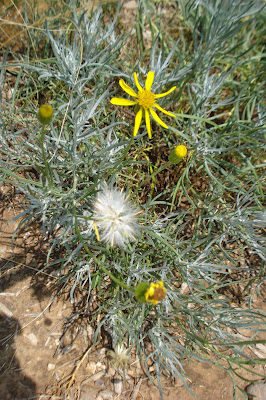Xanthisma spinulosum
These are "wildflowers" in Lubbock (our wildflower selection is pretty limited!) that I dug up and relocated into my rock garden. I think they are Spiny Goldenweed.
From Blooming at Academy Village:
Spiny goldenweed is a small, rounded native perennial whose lovely
yellow flowers appear in April and then again with the monsoon rains.
Growing to no more than a foot, it can be used in a native garden almost
as a groundcover. The petals fold in at night but soon open with
morning sun.
This plant is probably not available commercially. Cherish the ones
you have. Seed can be collected. Simply rake into the ground and wait
for new plants to appear. Goldenweed responds well to shearing. Cutting
back after the spring flush of flowers will create a compact plant and
will not delay summer flowers.
Wildlife value: attracts insects and small butterflies
I dug these up in the spring when they were still fairly small. They went through about a week of mild transplant shock and since then have bloomed repeatedly throughout the summer.
The fine textrued gray-green foliage contrasts nicely with other elements of the garden. Mine is low-growing, about 6" - 8" tall, and as their name suggest, they are somewhat "prickly," though not "stickery" like a cactus. They like it hot and dry!
 |
Spiny Goldenweed - Xanthisma spinulosum
|
 |
Spiny Goldenweed - closeup of leaves
|




























